Reminder again: As we age, our bones are more prone to osteoporosis! If you don’t want to get old and feel weak all over, you can take a look at NMN
Our bones become fragile and prone to breakage as we age.
The current effective treatment methods can only moderately increase bone mineral density and cannot solve the fundamental cause of osteoporosis – the decrease in human bone mass and bone density.
However, a recent study from the University of Sydney in Australia has brought hope.
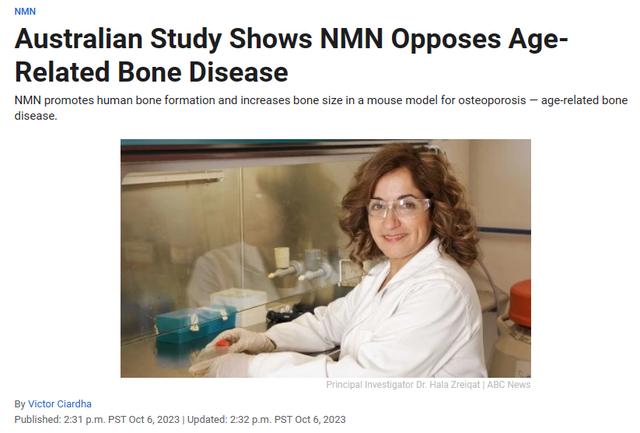
Researchers have found that low levels of NAD+may be one of the main causes of osteoporosis.
NAD+is an important coenzyme involved in cellular energy metabolism and redox reactions. It promotes the metabolism of glucose, fat, and protein within cells, helping to produce the energy (ATP) needed by cells.
In addition, NAD+is also involved in cell DNA repair and apoptosis, helping to maintain gene stability and cell health. As age increases, NAD+levels decrease, which is related to many age-related diseases.
Therefore, supplementing NAD+can promote energy production and cellular function, helping to maintain overall health.
As a precursor of NAD+, the efficacy of NMN is self-evident.
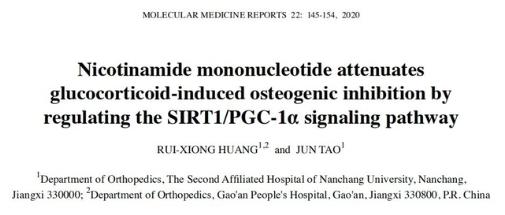
Through a series of experiments, researchers have found that NMN is an effective and feasible therapeutic candidate drug that can prevent osteoporosis and enhance the bone healing ability of older people people with osteoporosis.
The research results published by two orthopedic experts from the Second Affiliated Hospital of Nanchang University in the Journal of Molecular Medicine Reports once again strongly demonstrate the improvement effect of NMN on hormone induced osteoporosis.

Our bones are composed of active cells and maintain their health by constantly updating and replacing old and damaged bone tissue.
However, as we age, the available bone forming cells in our body gradually decrease,
which is partly attributed to the gradual aging of normal bone forming cells.
These aging cells lose their normal functions and are unable to effectively form new bone tissue,
leading to the occurrence of osteoporosis.
So, what is the principle behind NMN’s role in delaying osteoporosis?
NMN restores the vitality of bone forming cells
To investigate the role of NMN in osteoporosis,
researchers from the University of Sydney in Australia conducted a study on human bone forming cells.
To simulate the aging process, researchers exposed bone forming cells to TNF – α. This pro-inflammatory factor can promote the aging of bone forming cells.
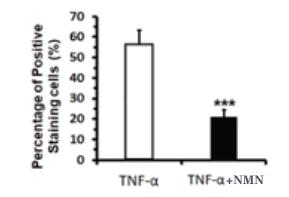
In the study, researchers found that using NMN for treatment can significantly reduce the degree of aging of bone forming cells,
resulting in a nearly 3-fold decrease in their aging rate.
This discovery indicates that β-Nicotinamide Mononucleotide has the ability to reduce the number of aging cells,
providing a promising method for treating osteoporosis.
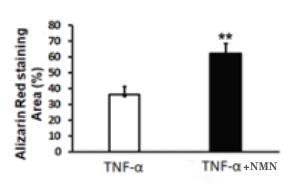
During the formation of bones, healthy osteoblasts transform into mature bone cells to generate new bone tissue.
Researchers have found that inducing aging through the use of pro-inflammatory factor TNF – α can reduce the number of mature bone cells.
This means that the ability of bone formation will be affected
by a decrease in the number of bone cells and may lead to the occurrence of osteoporosis.
NMN increases bone size
To test the effect of NMN on osteoporosis, researchers injected 400mg/kg/day of NMN into osteoporotic mice for 2 months.
As a result, the bone volume of osteoporotic mice increased, indicating that NMN partially reversed the signs of osteoporosis.
Combining human bone forming cell data, this suggests that NMN may be able to treat osteoporosis by increasing bone formation.
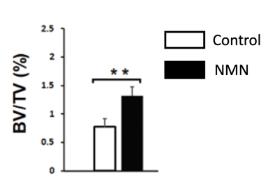
These studies indicate that as age increases, NAD+levels decrease, leading to the occurrence of osteoporosis.
By supplementing with NMN, the conversion of NMN to NAD+can promote the growth and differentiation of bone cells,
increase bone density, and maintain bone health.
Summary:
The principle of NMN in preventing osteoporosis lies in its role in promoting bone formation,
inhibiting bone resorption, and providing antioxidant protection.
It can activate growth factors and proteins in bone cells,
promote the formation of bone tissue, and regulate the function of bone resorption cells, reducing bone loss.
In addition, NMN also has antioxidant properties, which can reduce the damage of oxidative stress to bone cells.



